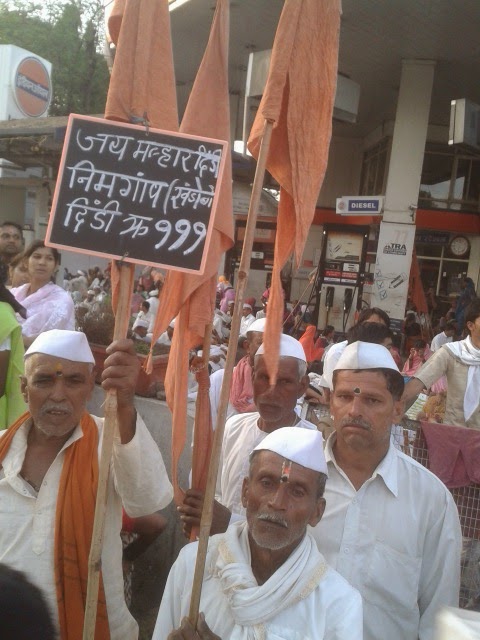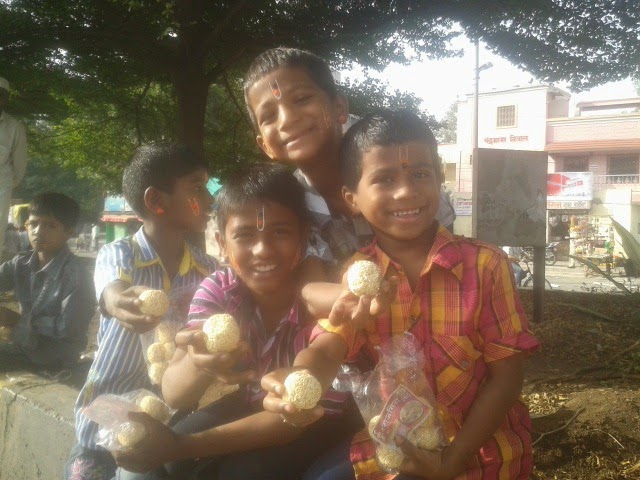Walking with the Warkaris
.jpg)
“My feet are tired but my soul is rested”, beautiful words from Gandhi, describe our state of being as we struggle to walk that ‘last mile’ to reach the Nature Cure Ashram where Madhavi tai from the Vinoba Ashram at Pavnar has invited us to stay the night. It feels nothing short of a miracle for us to have just completed this 33 kilometer walking pilgrimage from Pune to Saswad in rather scorching heat as part of the annual Pandharpur waari. Maybe it was the Shakti of Bhakti (the power of faith) that kept us going through an incredible 15 hour walk.
Growing up in Maharashtra, one cannot miss the annual pilgrimage that takes place from Alandi to Pandharpur. Popularly called as ‘waari’ or 'palkhi', it is a tradition going back over 700 years and draws over a million people annually to walk a distance of about 250 kilometers spread over 18 days through villages, towns and cities. This year, we felt a spontaneous call to join-in the pilgrimage even if for a short time, and to really understand the spirit of this walk that has just passed us by for so many years. With no definite plan, no particular agenda, not really knowing much, we ‘took the plunge in this river of a pilgrimage’, and end up getting completely soaked in its flow of amazing generosity, bhakti (devotion) and the celebration of life.
As we started walking at 5 am, accompanied by hundreds of thousands of pilgrims (warkaris) chanting, it truly felt like being part of a river—a river that would eventually dissolve in the ocean of faith and humanity when over a million pilgrims conclude their journey at the Vitthal temple in Pandharpur. Innumerable dindis or tributaries representing followers of various saints and their teachings come from the tiniest of villages scattered across the rural landscape of Maharashtra to join this river. Every soul is welcome and the river simply embraced every pilgrim with open arms, washing away any apparent distinctions of socio-economic class, caste or gender. A sense of camaraderie and fellowship naturally flows amongst people, as they walk together. Not even once are we asked what we do for a living, what is our educational background, or what caste we belong to.
Sant Dnyaneshwara one of the patron saint of this walk, is lovingly called Mauli (Mother) for having bestowed the wisdom and knowledge of universal peace upon the world. A beautiful tradition of this waari is that the pilgrims refer to each other as alsoMauli, as a way of acknowledging and bowing down to the divine in each other. In a very touching moment, as we stand praying outside a temple, an old grandma coming out of the temple, bends down to touch our feet and before we could respond, she happily glides away to join her friends. Around the same time, a flowering tree overhead sends down a shower of flowers upon us as if saying “I honor the Divine in you”.
Something melts in the heart space, as tears of gratitude flow freely and the mind becomes still.
We meet with many elderly folks who have been coming on this waari for several decades. One grandma in her eighties chuckles, “My family worries about me as they think that I cannot do this any longer. But, every year, I just can’t help it, as my whole being feels the call to walk!”. Another tiny grandma in her 80′s when asked how long she had been walking, kindly looks us in the eye and says, “Why bother with numbers. Just chant His name and walk His path”
It is very moving to see a physically-disabled man on a hand-operated bicycle as he cycled along with unknown fellow pilgrims offering help whenever he needed a push uphill. There are small kids, families—large and small, women walking barefoot, doctors' group, nature lovers’ group and even service groups like Rotarians taking a dip in the pilgrim’s river!
It is interesting for us to learn that there is no single authority or hierarchy that is trying to ‘control’ the flow of the river. Self-organizing and discipline prevails as pilgrims from all walks of life show up without invitation to be part of this sacred journey. When asked what brings them to this pilgrimage year after year, many express that they get tremendous ‘samaadhaan’ (sense of contentment) from joining the waari. We wonder how powerful this seed of faith must be, which has kept this tradition alive and thriving for several centuries.

As this endless stream of pilgrims passes through cities and villages, overwhelming generosity is offered to the pilgrims everywhere. Unlimited tea, water, bananas, sweets and hot food flows freely from the locals to the pilgrims. It seems as if everyone along the way wants to contribute their own bit to this flow. We enjoy receiving simple warm breakfast cooked with love by a family that we had never met who probably woke up at 4 am to cook this "prasad". Everywhere we see people opening up their homes to pilgrims for bathing and resting. All along the way, simple folks like barbers, cobblers and tailors offer their services as a gift to the pilgrim who is ready to receive. Keeping up with the modern times, some locals even offer free mobile phone charging service. Even local politicians, business people, government officials, police forces, social service organizations team up to be of service in various innovative ways. Free medicines, ambulances on motorcycles, doctors are available all along the way in case of emergency.
We feel pained, however, to witness the humungous amount of trash that gets created with the mineral water bottles, packaged food, plastic (tea) cups and plates. All along the route, we see shopping stalls with smart marketing strategies, selling artificially colored cold drinks, plastic toys, polyester clothes etc. Influencing the simple, rural folks with such surrogate marketing freebies and cheap products runs counter to the sanctity of this sacred pilgrimage which has so far stood the test of time. It is indeed a challenge for the waari to maintain its purity and environmental sensitivity in the face of an increasingly market-driven, consumption based lifestyle and the onslaught of urban/media influence.
On a heartening note, we saw small groups of volunteers doing small acts with great love. The forest department officials in Saswad town, gifted over 50,000 paper bags filled with seeds of various fruit trees and medicinal plants to the pilgrims requesting them to plant those seeds along the journey. Young eco-lovers perform street-plays to generate awareness on organic farming. Our elders from the Vinoba Ashram at Pavnar are distributing copies of the Geeta and offering public discourses on the topic .
After having just climbed up a long mountain stretch, our bodies are exhausted. We are pleasantly surprised when a young man walks up to us and asks "May we offer you a foot massage". About a 100 volunteers have turned up from a nearby city to sit in the hot sun with a bottle of oil to lovingly massage the feet of the pilgrims. How healing and rejuvenating it felt to be at the receiving end of such love!
A beautiful quote from The Prophet comes to mind as we see all these volunteers selflessly serve: “You give but little when you give of your possessions. It is when you give of yourself, that you truly give”. Grateful for this gift, we volunteer to press the feet of the next pilgrim in line, inspired to pass on the love we have just received.

Whenever we express interest in learning more about the bhakti tradition, seasoned warkaris very enthusiastically shared their songs, stories and experiences. An old grandfather, ends up offering us his personal prayer book containing songs and hymns (bhajans and abhangas) of Saint Tukaram.
Thoughout the walk, spontaneous chants of “Gyanba, Tukaram”, “Vitthal, Vitthal” and “Jai Jai Ram Krishna Hari” resound in the air. Caught up in the devotional air, we start singing and dancing ​to the tune of soulful bhakti songs which brings alive a sense of collective celebration. It is amazing to see men and women pair up to a spontaneous phugadi dance or following rhythmic steps to the sound of drum-beats and cymbals. Flags, multi-colored outfits, sarees, Gandhi topis, dhotis, flowers, every little thing adds its own charm and beauty to the multi-pronged gathering.
After experiencing ‘a day in the life of warkaris’, we return home, our physical bodies completely exhausted, our clothes soiled with dust yet our spirit feeling cleansed and faces beaming with joy! In the future, we pray for the blessing to be able to walk the full length of the pilgrimage and invite like-hearted souls like you to join us on this walking university of life!
Experiencing deep humility and gratitude in our hearts for the countless "Maulis" we were blessed by today.
.jpg)
You can view more photos at: https://plus.google.com/photos/104832533082701031173/albums/6028476239166083361?banner=pwa
Listen to "Vitthala Vitthala" at: www.youtube.com/watch?v=kf2OjxMxZHo​
Posted by Vipul Shaha on Jul 1, 2014 | permalink
-
Vijay wrote ...
I have heard about this and never stopped dreaming about joining the walk one day. It is the sheer length of the walk that seized me in the first place. The community aspect is also lovely. I love walking and doing this will be taking it to its limits. Would love to get more details. Are you planning the whole walk next?
-
satwinder wrote ...
Amazing walk indeed.
I didn't know about this before. May be we should walk for world peace / better Govt. / Responsible Govt / Accountable Govt. / Moved by love themes
That sure would be wonderful cause...
Religion used to unite us strongly. Times have changed and we need to change our thinking too...

Kanchan wrote ...
What a beautiful experience!! I would love to join sometime!! Thanks so much for sharing!!